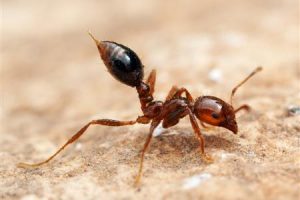How Long Do Fire Ant Bites Last?
If you or your child has had an unfortunate interaction with a fire ant colony, you may be wondering how long the bites last, how to treat them, and even how to prevent them. Read on to discover what to expect from fire ant bites and why you should call Fire Ant Control, LLC, to keep their populations under control.
Fire Ant Bite Primer
 Fire ants can bite down with their jaws, holding onto the skin tightly while stinging simultaneously, injecting a unique venom that only they have. In most cases, these bites aren’t a threat to human life, although they are quite painful. A tiny percentage of the population does need to be aware of the potential for anaphylaxis in response to the venom.
Fire ants can bite down with their jaws, holding onto the skin tightly while stinging simultaneously, injecting a unique venom that only they have. In most cases, these bites aren’t a threat to human life, although they are quite painful. A tiny percentage of the population does need to be aware of the potential for anaphylaxis in response to the venom.
The red imported fire ant is quite aggressive and is primarily found in the Southeast region of the US, with some population extension across the entire southern half of the country. The nickname, fire ant, comes from the burning pain left behind after an attack.
Potential Fire Ant Bite Victims
Fire ants will bite anyone they perceive to be a threat. Their aggressive nature makes it extremely easy to become a victim. A child playing in the grass, a gardener reaching for a weed, a golfer focusing on the swing, and anyone else can become a fire ant attack victim.
Avoiding becoming a victim is most easily accomplished by limiting the fire ant presence on a property.
Symptoms of a Fire Ant Bite:
- Sharp pinch
- Redness
- Swelling
- Burning pain
- Itching
- Pimple-like blister
A single fire ant bite is a rare occurrence; they generally attack as a group. When several fire ant bites occur simultaneously, the symptoms will be amplified with greater pain intensity. The itchiness of the bites could remain for several days after the event.
Watch for the following signs of an allergic reaction, and get immediate medical attention if any of them occur:
- Hives and swelling other than the site of the bite
- Itchiness of the body other than the bite site
- Stomach pain
- Chest tightness
- Difficulty breathing
- Upset stomach or vomiting
- Dizziness
Fire Ant Bite Treatment
Fire ant bites can usually be treated at home. You can minimize the pain of the bite by washing the area with soap and water or cleaning it with an alcohol pad. Other treatments, depending on the severity or number of bites, can include applying ice to the area, using hydrocortisone cream or taking an antihistamine to stop the itching, taking an over-the-counter pain reliever, taking corticosteroids for swelling, and having an injection by an epi-pen in case of an allergic response.
While you might be tempted to pop the blister, don’t. An infection could set up in this area. If the blister bursts, make sure to keep the site clean. Watch out for signs of infection following a fire ant bite:
- Fever and/or chills
- Difficulty breathing
- Lingering pain and soreness
- Further swelling
- Fluid draining
- Scabbing
Fire ant bites usually go away after a few days, but they can linger for about a week. If the bite is still aggravated and you don’t feel well after about ten days, reach out to your primary care provider.
Prevent fire ant bites so that you do not have to worry about how long they last by contacting Fire Ant Control, LLC at 239-312-8200 or clicking here. We offer the most successful treatment available, one that targets the reproductive abilities of the queen to stop the colony in its tracks. Within a single life cycle, your property will be up to 99% free of fire ant presence.
